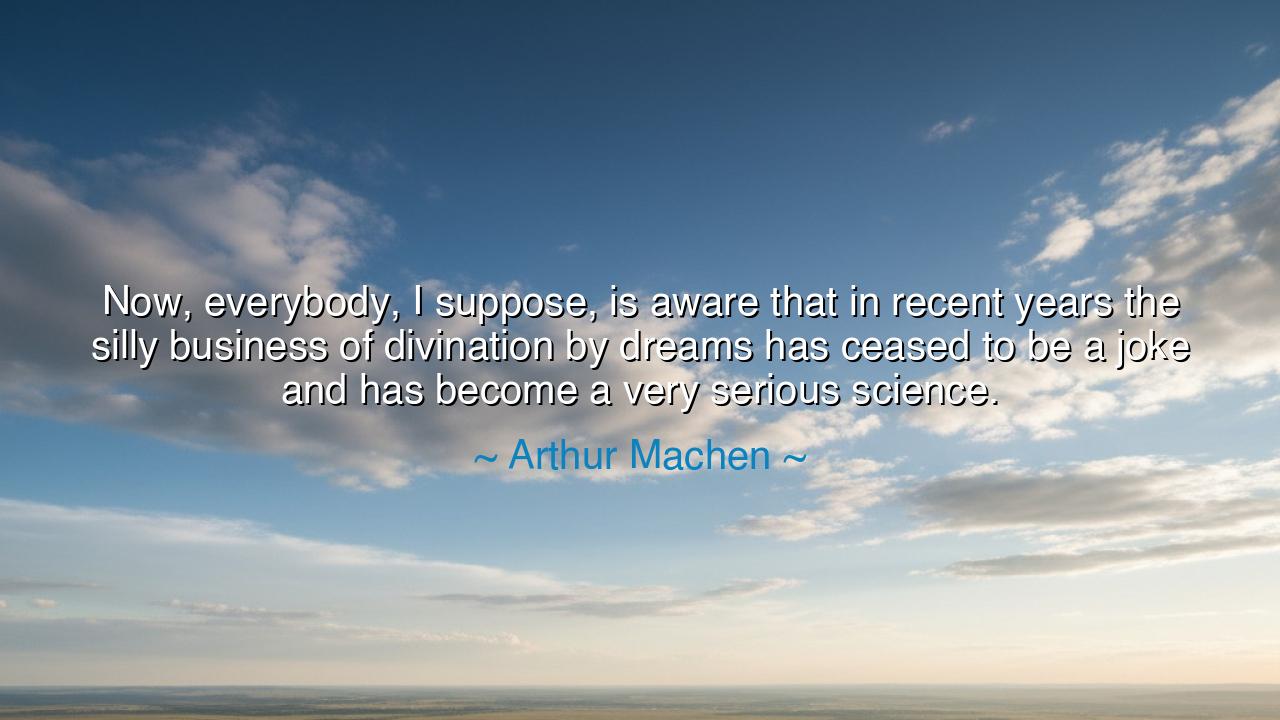
Now, everybody, I suppose, is aware that in recent years the
Now, everybody, I suppose, is aware that in recent years the silly business of divination by dreams has ceased to be a joke and has become a very serious science.






Hearken, seekers of wisdom and wonder, and attend to the words of Arthur Machen, that mystic of the written word, who declared: “Now, everybody, I suppose, is aware that in recent years the silly business of divination by dreams has ceased to be a joke and has become a very serious science.” In this reflection lies the recognition of a profound transformation — the journey of humanity from superstition to understanding, from mockery to reverence. What once was dismissed as foolishness, dream divination, has been reborn through inquiry, observation, and science as a window into the human soul.
Since the dawn of consciousness, humankind has sought meaning in the realm of dreams. The ancients of Egypt and Mesopotamia carved upon tablets their visions of the night, believing them to be messages from gods and spirits. The Greeks built temples to Asclepius, where supplicants slept to receive divine healing through dreams. Yet as the age of reason rose, the world grew skeptical. The “silly business” of interpreting dreams was cast aside, mocked as superstition and folly. Machen, writing in the shadow of the nineteenth century, witnessed a new awakening — the return of dreams to dignity through the lens of psychology and science.
The transformation Machen speaks of was kindled by figures such as Sigmund Freud and Carl Jung, who dared to study what others dismissed. Freud’s Interpretation of Dreams unveiled the hidden architecture of the unconscious, showing that dreams were not random illusions but reflections of inner truth. Jung went further, perceiving them as the language of the soul, connecting the dreamer to humanity’s collective unconscious. Through their work, dream analysis shifted from mysticism to a form of science, not in defiance of wonder, but in harmony with it.
Machen, a master of the mystical and psychological, understood that science and mystery are not enemies, but partners in revelation. His words remind us that knowledge often begins where faith once stood. The path of progress is not to destroy the old but to reinterpret it — to find the wisdom hidden beneath myth and superstition. The divination of dreams, once a ritual of incense and prophecy, became through study a mirror to the mind, showing that every vision of the night is shaped by memory, desire, and fear.
Consider also the story of Dmitri Mendeleev, the great chemist who dreamed of the periodic table. After years of study, exhaustion overtook him, and in sleep, the elements aligned before his eyes. Upon waking, he transcribed the vision exactly, and it proved true. This moment — half dream, half revelation — embodies Machen’s meaning: what once was dismissed as “divination” can, under the gaze of discipline and insight, reveal genuine knowledge. The border between the mystical and the scientific is far thinner than the modern mind imagines.
The deeper lesson here is humility. Humanity must remember that the mysteries of the spirit are not to be mocked, for in every dismissed superstition may lie the seed of a truth yet undiscovered. What we call science today often begins as wonder misunderstood. To “divine by dreams”, whether through symbol, intuition, or research, is to listen — not to ghosts, but to the quiet voice of the self and the universe.
Practical wisdom arises from this teaching. Keep a record of your dreams, not as omens, but as reflections. Study them as a scientist studies the stars, with curiosity and patience. In them you will find not prophecy, but revelation — insights into the architecture of your own mind. Remember that Machen’s words are not about dreams alone, but about the progress of understanding: that what we mock in ignorance, we often rediscover in enlightenment.
Finally, take from this the eternal truth: knowledge grows where wonder is preserved. Do not dismiss what you cannot yet explain. The “silly business” of yesterday may become the sacred science of tomorrow. Let curiosity and reverence walk hand in hand, for only then can humankind bridge the distance between the seen and the unseen — between the waking world and the one that speaks to us in dreams.






AAdministratorAdministrator
Welcome, honored guests. Please leave a comment, we will respond soon